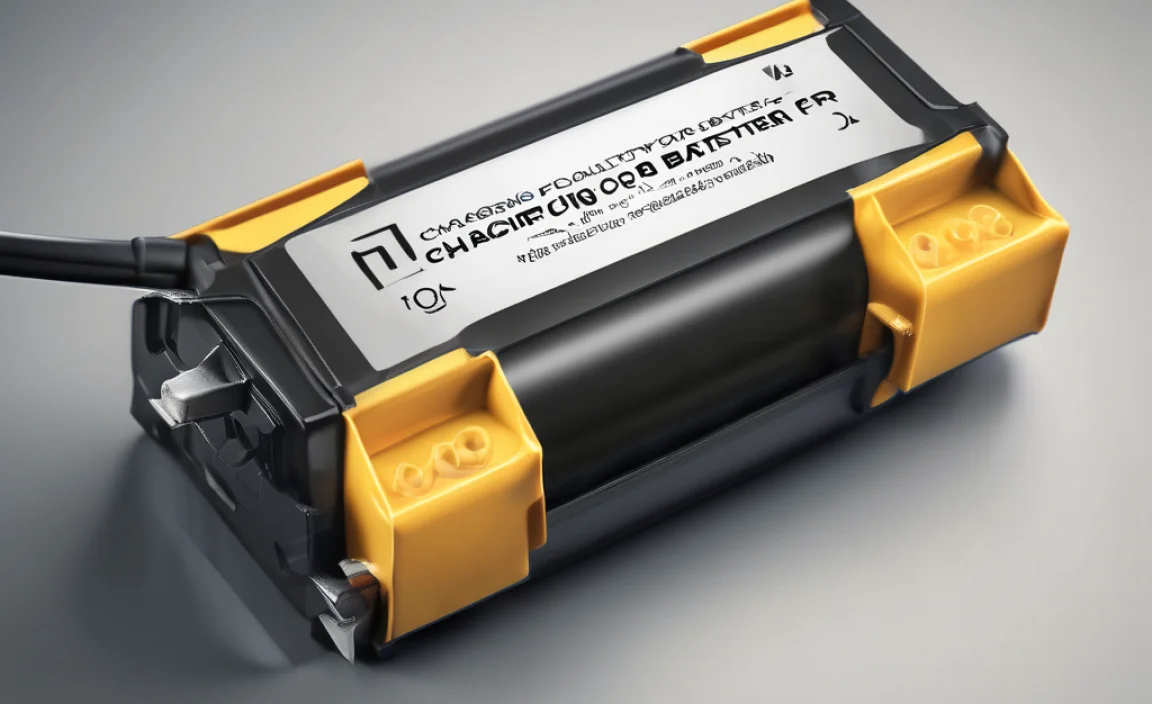Yes, you can get paid for recycling your old car battery! Many scrap yards and recycling centers pay cash for lead-acid car batteries because the lead and plastic inside are valuable. It’s a great way to make a little extra cash while also doing something good for the environment.
Is your old car battery taking up space, or maybe you’re just replacing it and wondering what to do with the old one? You’re not alone! Dealing with a dead car battery can feel like a real hassle. Sometimes, it feels like you have to pay to get rid of them. But what if I told you that your old battery could actually put some money back in your pocket? It’s true! The materials inside car batteries are surprisingly valuable, and recycling them is a smart move for both your wallet and the planet. This guide will walk you through everything you need to know, making it simple and safe to turn that old battery into a little bit of cash.
Why Recycle Your Car Battery for Cash?
Car batteries are a bit like treasure chests of materials. They’re mostly made of lead and plastic, both of which are highly recyclable and have significant market value. When you recycle your car battery, you’re not just getting rid of waste; you’re contributing to a circular economy where valuable resources are reused instead of being thrown away.
Here’s why it’s such a good idea:
- Earn Money: The most direct benefit is getting paid for your old battery. The price can vary, but it’s a nice bonus for something you need to dispose of anyway.
- Environmental Protection: Car batteries contain harmful acids and heavy metals like lead. If not disposed of properly, they can leak into the soil and water, causing serious pollution. Recycling ensures these materials are handled safely.
- Resource Conservation: Recycling lead means less need to mine new lead, which is an energy-intensive and environmentally impactful process. It conserves natural resources for future generations.
- Energy Savings: Recycling lead uses significantly less energy than producing new lead from ore.
Think of it as a win-win-win: you make money, protect the environment, and help conserve resources. It’s a small action with a big impact.
Understanding Car Battery Value
The amount of money you can get for your car battery usually comes down to a few key factors:
- Weight: Batteries are priced per pound. Heavier batteries, typically from larger vehicles, will fetch more money.
- Lead Content: Car batteries are primarily lead-acid batteries. The price of lead on the global market directly influences what recyclers can pay you.
- Market Fluctuations: Like any commodity, the price of lead can go up and down. This means the cash you receive might be slightly different from week to week.
- Location: Prices can vary depending on where you are. Recycling centers in areas with higher demand or more processing facilities might offer better rates.
- Condition: While most places accept dead or discharged batteries, severely damaged or badly corroded ones might be worth less.
Generally, you can expect anywhere from $5 to $20 or more for a standard car battery, depending on the above factors. It’s not going to make you rich, but it’s a fair compensation for a heavy, bulky item.
Where to Recycle Your Car Battery for Money
Finding a place to take your old battery is usually straightforward. Here are the most common options:
Scrap Metal Yards
Many general scrap metal yards accept car batteries. They are equipped to handle them and will pay you based on the weight and current lead prices. It’s often the most direct way to get cash.
Automotive Parts Stores
Major auto parts retailers, like AutoZone, Advance Auto Parts, and O’Reilly Auto Parts, often have battery recycling programs. While they might primarily do this to ensure proper disposal and sometimes offer a core charge refund on a new battery purchase, they will usually take old batteries. Check with your local store whether they offer cash for them or only as part of a trade-in for a new battery.
Battery Specialists and Recyclers
Dedicated battery recycling companies or specialists are experts in battery disposal and often pay for old batteries. A quick online search for “car battery recycling near me” should help you find them.
Garages and Repair Shops
Some local mechanics and auto repair shops will take your old battery, especially if you’re having work done there. They often have arrangements with recyclers. It’s always best to ask beforehand if they offer any cash for it.
Local Waste Management or Household Hazardous Waste (HHW) Facilities
While many HHW facilities are primarily focused on safe disposal and may not pay cash, it’s worth checking. Some municipal programs might have partnerships or incentives for recycling lead-acid batteries.
How to Safely Remove and Transport Your Car Battery
Handling a car battery requires caution. They are heavy and contain a corrosive acid that can cause serious burns, and they can also produce flammable gases. Always prioritize safety!
Tools You’ll Need
- Safety Glasses: Essential to protect your eyes from acid splashes or battery gas.
- Gloves: Heavy-duty, acid-resistant gloves will protect your hands.
- Wrench or Socket Set: To loosen and remove the battery terminals and hold-down clamp. A 10mm or 13mm wrench is common for terminals.
- Battery Terminal Cleaner/Wire Brush: For cleaning off corrosion.
- Rags or Paper Towels: For cleaning up any minor spills.
- Small Piece of Wood or Plastic: To place under the battery during transport.
Step-by-Step Removal Process
Remember to always work in a well-ventilated area, away from sparks or open flames.
- Turn Off the Engine and Remove the Key: Ensure the car is completely off and the engine has cooled down.
- Locate the Battery: In most cars, it’s under the hood. Some vehicles have it in the trunk or under a seat. Consult your car’s manual if you’re unsure.
- Identify Terminals and Cables: You’ll see two large cables attached to the battery posts. One is positive (+, usually red) and the other is negative (-, usually black).
- Disconnect the Negative Terminal First: This is the MOST IMPORTANT SAFETY STEP. Use your wrench to loosen the nut on the negative terminal clamp. Gently twist and pull the cable off the post. Move this cable far away from the battery so it can’t accidentally touch the terminal.
- Disconnect the Positive Terminal: Now, loosen the nut on the positive terminal clamp. Twist and pull the cable off the post.
- Remove the Hold-Down Clamp: Batteries are secured by a clamp at the base or top. Loosen and remove the bolts holding this clamp in place. Keep the bolts safe!
- Lift the Battery Out: Car batteries are heavy, often weighing 30-50 pounds. Use a proper lifting technique (bend your knees, keep your back straight) or ask for help. Try to keep the battery upright to prevent acid spillage.
- Clean the Battery Tray and Terminals: Use a wire brush or terminal cleaner to remove any corrosion from the battery tray and the car’s cable connectors.
Transporting Your Battery Safely
Once removed, you need to transport your battery to the recycling center. Safety is key here too:
- Keep it Upright: Always transport the battery in an upright position to minimize the risk of acid leaks.
- Secure It: Don’t let the battery roll around in your car. Place it in your trunk or on the floor of your back seat.
- Use a Battery Case or Box: If you have an old battery box or even a sturdy plastic tub, place the battery inside it. This adds an extra layer of protection against spills and makes carrying easier.
- Prevent Short Circuits: Ensure the terminals cannot touch any metal objects. You can cover them with plastic wrap or rubber caps if you have them.
- Ventilation: Keep your car windows slightly open to allow for ventilation, as batteries can emit hydrogen gas.
What to Expect When You Sell Your Battery
The process at a scrap yard or recycling center is usually quite simple:
- Drop Off: Inform the staff you have a car battery for recycling. They’ll likely direct you to a specific area.
- Inspection: They will quickly look at the battery to ensure it’s a standard lead-acid car battery and not severely damaged or altered.
- Weighing: The battery will be placed on a scale to determine its weight.
- Payment: You’ll be paid based on the current price of lead per pound, minus any small handling fees (though many places don’t charge fees for batteries).
What They DON’T Want
Recyclers are usually looking for standard 12-volt lead-acid car batteries. They generally will NOT accept:
- Lithium-ion batteries: Found in newer electric vehicles (EVs) and many electronic devices – these require specialized recycling.
- Budget batteries with less lead.
- Batteries that are physically cracked or leaking acid significantly.
- Other types of batteries (e.g., from boats, motorcycles, or deep cycle batteries) unless the yard specifically states they accept them. It’s always best to call ahead if you’re unsure.
Understanding Core Charges
When you buy a new car battery, you’ll often pay a “core charge.” This is an extra fee added at the time of purchase that you get back when you return your old battery. This system is designed to encourage battery recycling.
If you’re simply recycling an old battery and not buying a new one, you won’t be getting a core charge refund. Instead, you’ll be getting paid for the estimated value of the materials in the battery. It’s a different transaction, but both involve getting value from your old battery.
Environmental Regulations and Responsible Recycling
Recycling car batteries isn’t just good practice; it’s often mandated by law. Many states have regulations in place to ensure these hazardous materials are handled correctly. For example, the U.S. Environmental Protection Agency (EPA) provides guidelines on lead recycling and disposal to protect human health and the environment.
By choosing to recycle your battery at an authorized facility, you’re ensuring it’s processed in an environmentally sound way. These facilities:
- Safely neutralize the acid.
- Separate the lead, plastic, and other materials for reuse.
- Prevent hazardous substances from entering landfills or waterways.
This responsible approach is crucial. For more information on hazardous waste disposal, you can often find resources on your local government’s environmental agency website or the EPA’s website itself.
A Quick Look at Battery Types and Value
While we’re focusing on traditional car batteries, it’s helpful to know there are other types. The value you get typically depends on the lead content, which is highest in standard automotive batteries.
| Battery Type | Typical Use | Lead Content | Value Potential |
|---|---|---|---|
| Lead-Acid Automotive Battery (SLI) | Starting, Lighting, Ignition (Cars, Trucks) | High | Highest (paid based on weight and lead price) |
| Deep Cycle Battery | Boats, RVs, Golf Carts, Solar Storage | Moderate to High | Often accepted, value depends on specific type and lead content. Might be less than SLI for same weight. |
| Motorcycle/Powersports Battery | Motorcycles, ATVs, Scooters | Lower | Lower due to smaller size and weight. |
| Lithium-ion Battery | Electric Vehicles, Laptops, Phones | Very Low (contains lithium, cobalt, nickel, etc.) | None for cash value; require specialized recycling and may incur a fee. |
When seeking cash, prioritize the standard car batteries. They are the most consistently accepted and offer the best return for your effort.
Tips for Maximizing Your Earnings
While you won’t get rich, a few tips can help you get the most out of recycling your battery:
- Shop Around: Call a couple of different scrap yards or recycling centers in your area. Compare their prices per pound for car batteries.
- Hold Onto It (If you can): If you’re not in a rush, and you see the price of lead trending upwards, you might get a slightly better deal by waiting a short while.
- Keep it Clean (Visually): While they don’t expect it to be sparkling, a battery that doesn’t look overly damaged or corroded might be accepted more readily.
- Bundle Up: If a friend or neighbor also has an old car battery, combine your trips and bring both to the recycler. More weight equals potentially more cash.
When to Replace Your Car Battery
Knowing when to replace your car battery is key to avoiding being stranded. Here are some common signs:
- Slow Engine Crank: The engine sounds sluggish when you try to start it.
- Dim Headlights: Lights seem dimmer than usual, especially when the engine is off.
- Warning Light: The battery warning light or check engine light comes on your dashboard.
- Corrosion: You see a white or bluish powdery substance around the battery terminals.
- Bulging or Swollen Case: The battery case looks warped or swollen, which is a sign of damage or overheating.
- Old Age: Most car batteries last 3-5 years. If yours is approaching or past that mark, it might be time for a proactive replacement.
If you notice any of these signs, it’s a good idea to get your battery tested at an auto parts store or a mechanic. They can tell you its condition and if it needs replacement.
Frequently Asked Questions (FAQs)
Q1: How much money can I really expect for an old car battery?
You can typically expect anywhere from $5 to $20 for a standard lead-acid car battery. This amount depends heavily on the battery’s weight, the current market price of lead, and the specific recycling center’s rates.
Q2: Do I need special equipment to remove a car battery?
You’ll need basic tools like a wrench or socket set for the terminals and hold-down clamp. Most importantly, always use safety glasses and gloves to protect yourself from acid and potential sparks.
Q3: Can I just throw my old car battery in the trash?
No, absolutely not! Car batteries contain hazardous materials like lead and sulfuric acid, which can pollute the environment. They are considered hazardous waste and must be recycled properly. Many places have laws against disposing of them in regular trash.
Q4: What if my car battery is leaking acid?
If your battery is leaking acid, handle it with extreme caution. Wear thick, acid-resistant gloves and eye protection. Try to keep the battery upright during transport and place it in a strong plastic container or box to catch any leaks. Inform the recycling center staff that it’s leaking.
Q5: Can I get cash for batteries from other vehicles, like motorcycles or RVs?
Some places will accept other types of lead-acid batteries, like those from motorcycles or RVs, but the payout might be less due to their smaller size and weight. It’s best to call ahead and confirm if they accept them and what their rates are.
Q6: What if I’m buying a new battery? How does that relate to selling my old one?
When you buy a new battery, you usually pay a “core charge” which you get back as a refund when you return your old battery. If you’re just selling your old battery for cash, you’re not getting a core charge refund; you’re getting paid for the scrap value of its materials.
Q7: Are electric car batteries worth money for recycling?
No, electric car batteries (lithium-ion) are very different from traditional lead-acid car batteries. They do not have scrap value for you to get cash. They require specialized recycling processes, and sometimes there can be a fee associated with their disposal.
Conclusion
Recycling your old car battery for cash is a practical and environmentally responsible decision. It’s a simple process that requires paying attention to safety and knowing where to go. By following the steps outlined in



